You are on vacation and you have a few days left. You would like to go diving but your return flight will departure the next day. Will flying after diving be convenient?
In this article we want to share with you some important principles and concepts so that you can make a good decision and be healthy to return home. Safety is first.
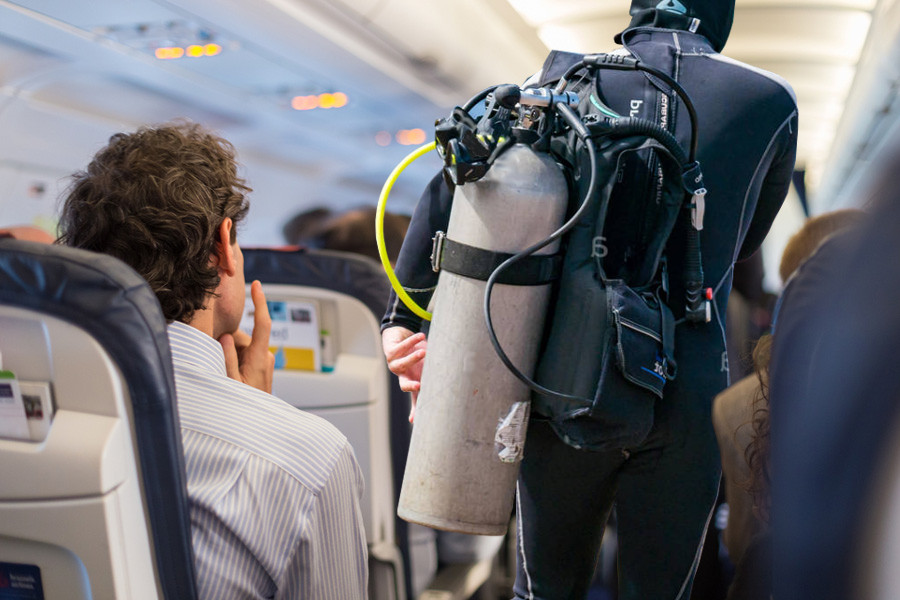
What is Decompression Sickness and why is it so dangerous?
Decompression Sickness, also commonly referred to as DCS is a very dangerous condition related to scuba diving.
According to Divers Alert Network and other organizations, the condition can be exacerbated by a person being exposed to a high altitude too soon after scuba diving. For this reason, flying after diving is often discouraged for divers without waiting a specific amount of time.
DCS is the body’s reaction or injuries that are related to the rapid lowering of the pressure of the air around the body. Decompression Sickness is also known by other terms like; Barotrauma and the Bends (as associated with scuba diving).
While Decompression Sickness can also result from exposure to extreme high-altitudes without being in a pressurized cabin, it is found more frequently in scuba diving incidents.
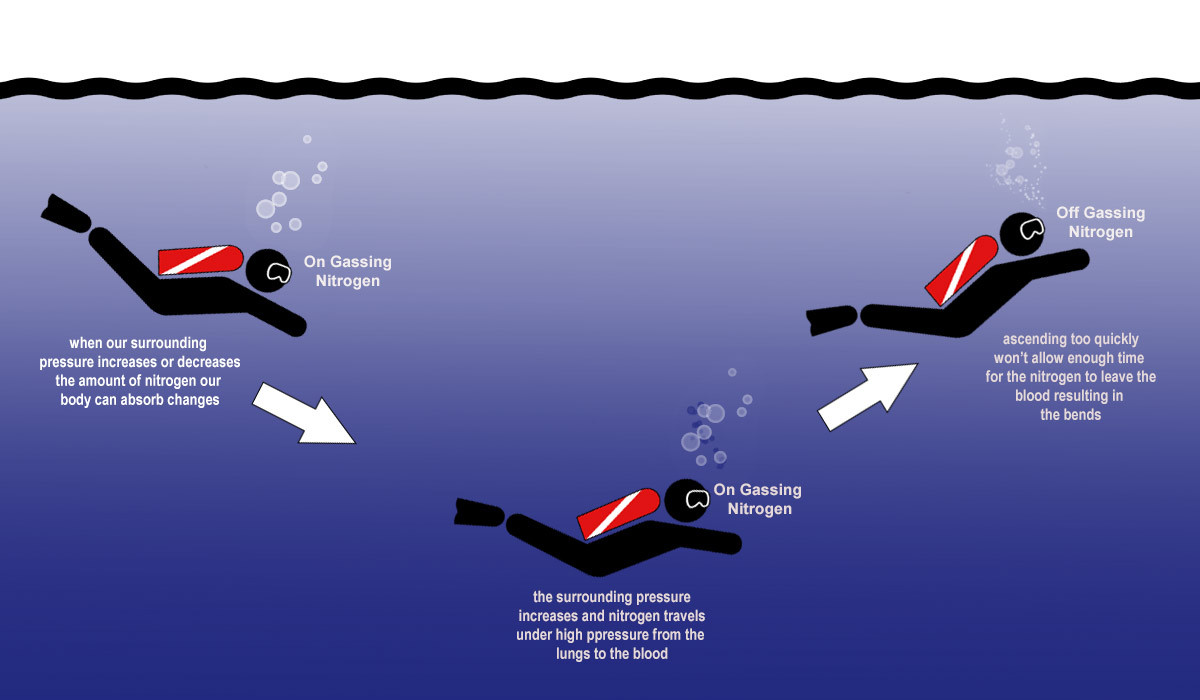
The reason why rapid decompression is a big problem for divers is due to the air mixture inside the tank.
The tanks are used in scuba diving to provide necessary oxygen while the divers are underwater. While a small percentage of divers use pure oxygen when diving, the primary mixture is oxygen and nitrogen. The oxygen component is used by the body. However, the nitrogen component of the mixture is dissolved directly into the bloodstream.
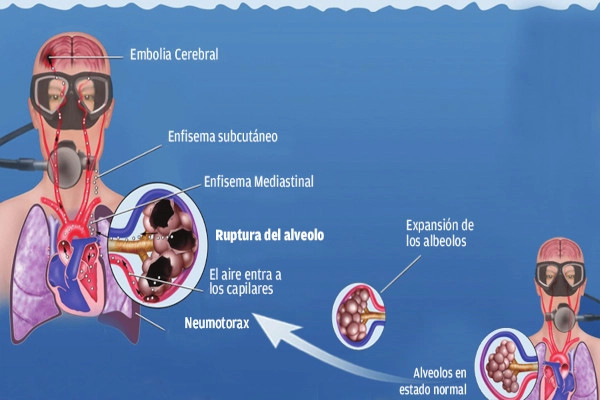
Decompression sickness explained in a video
The following video from TED education explains very precisely what decompression sickness is and how bodies behave under pressure.
Read also: 6 Important things to consider before the dive
Under normal circumstances, the nitrogen that has been dissolved into the blood is able to safely escape. Unfortunately, if the pressure around the body is decreased too fast, the nitrogen is released too quickly causing bubbles in the blood or surrounding tissue. This is what is referred to as Decompression Sickness or the Bends, in the case of scuba diving. If you want to know more about decompression sickness check out this PADI article.
Excess nitrogen remains dissolved in body tissues for at least 12 hours after each dive.
For this reason, repeated dives in one day are more likely to cause decompression sickness.
Decompression sickness can also occur if the pressure drops below atmospheric pressure. This is the case with commercial flights.
What are the symptoms of decompression sickness
Symptoms can appear immediately and in some cases progressively. According to severity, they can be classified as type I and II
Type I decompression sickness symptoms
- Progressive, deep and increasing pain in the joints, mainly elbows and shoulders and in the muscles. Pain does not intensify during movement.
- Lymphadenopathy
- mottled skin, itching, and rash.
Type II decompression sickness symptoms
They tend to be a bit more serious, as they include neurological and sometimes respiratory aspects. They usually manifest as
- Paresis
- Numbness and paresthesias
- Neuroapraxia
- Difficulty urinating and loss of bowel or bladder control.
- Sometimes headache and asthenia.
- In some cases, dizziness, tinnitus and hearing loss.
The most serious symptoms include
- Seizures
- Difficulties in diction.
- Sight loss.
- Confusion and coma.
Dangers of flying after diving
As discussed previously, prolonged exposure to the oxygen and nitrogen mixture that is contained the majority of all recreational scuba diving tanks creates a potential danger to all divers.
However, with proper training and strict adherence to all of the proper procedures and regulations put forth by governing body’s that are responsible for oversight of the scuba diving industry the risks are diminished.
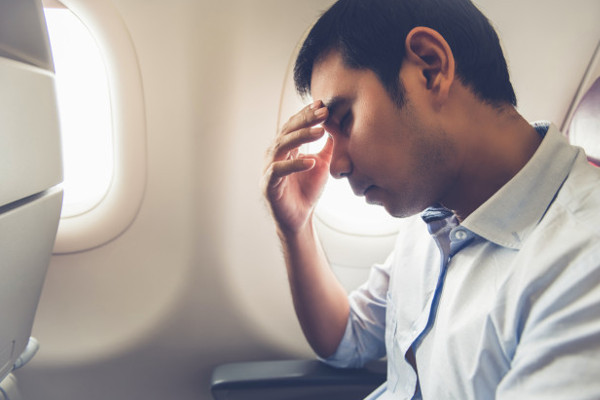
One of those strict guidelines that help to protect the individual from possible serious illness or injury is the concept of avoiding flying in a commercial plane for a certain amount of time.
This time depends on some factors, but it starts with 12-hours and it goes up from there. To help better explain the point better, we have included a sample of the recommended safety precautions in regard to the amount of time a person should wait before they go onto an airplane.
- One Single Dive 12+ hours
- Multiple Dives in a day 18+ hours
- Multiple Days of diving 18+ hours
- Decompression Diving 24+ hours
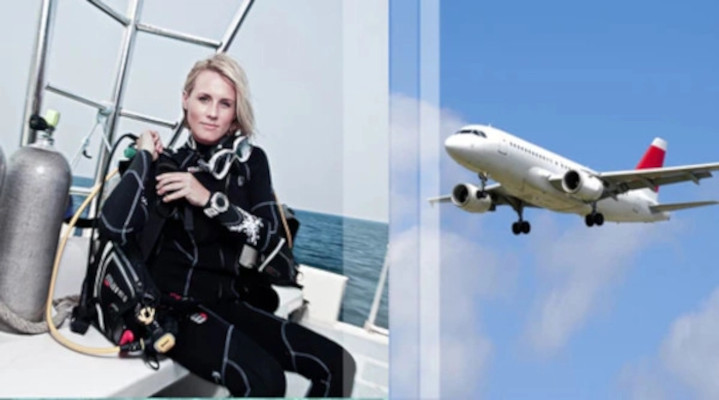
Don’t rely only on technology
Technology is a wonderful thing. However, there are things that you may not want to put in the hand of a piece of equipment. Dive computers can keep the track of a lots of things. One of them is the nitrogen saturation or the amount of nitrogen that has been absorbed into your bloodstream.
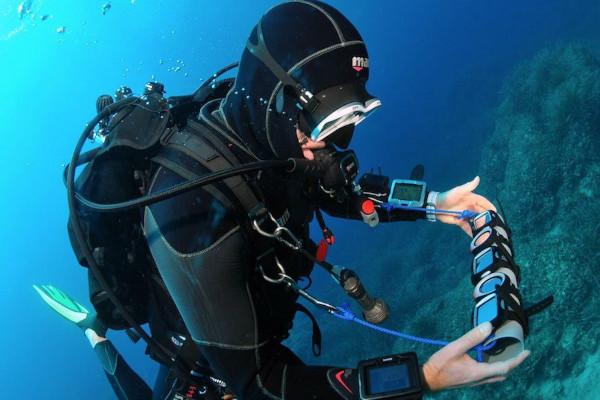
Unfortunately, not all computers work the same in how they keep track. Many of these only use an arbitrary countdown from 18 hours backward. Then let you know when it should be safe for you to fly. However, there are some that are good enough to calculate your actual saturation level of nitrogen.
What about diving after flying?
Although there should not be any problem diving after flying, it is important for you to hydrate well during the trip, since dehydration is a factor that often makes it more difficult to eliminate inert gases from the body, of which the Nitrogen is part of one of them.
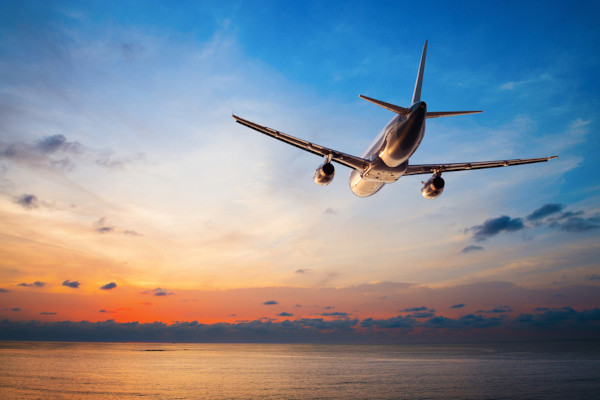
In addition, long-distance travel can cause sleep disturbances and time lag. We encourage you to follow our advice and take some time to recover from the trip before the first dive.
What other things you should not do immediately after diving?
Try not to warm up your body too quickly after a dive
The recommendation of medical professionals is to warm up but little by little, after a period of immersion, so that the dissolved gases in your body can slowly leave it at a safe rate. Experts consider that it is NOT a good idea to take a hot shower, or drink hot drinks, because these things will cause the body to rise in temperature very quickly, which can be bad for your health.
One of the things you could do is using one of those special blankets to regain temperature after diving, which allow the body to client at its own pace, but not everyone can access this type of resource.

Do not consume a lot of alcohol
The recommendation we give you is to drink , but only hydritating drinks.
Try to avoid alcohol after the dive, because it has an anticoagulant effect and that will not favor your decompression.

Try not to exercise too hard
It is very important not to do activities that require a lot of physical performance after diving. Although it is not scientifically proven, we do not recommend lifting heavy objects or going to the gym right after a dive.
Rather, our recommendation is to take it easy and let the body decompress naturally.

Try not to take a full massage
A full-body massage can release a lot of dissolved fluid or gases trapped in your muscle tissues, and let them circulate where they shouldn’t be.

“I wish I had known this earlier”- A particular case
Clarita had planned her trip to Mexico throughout the year.
She and her two friends got themselves on the adventure of visiting the beaches of Central America.
We were by beautiful beaches. Natural pools that were fed with the waters of the sea. We got to know places that we had only seen on postcards and in photos before that day.
We also went diving. To do this, since we were not certified divers, they provided us with a closed helmet, similar to the one used by astronauts.
The helmet had a tube in the back that reached the surface, and through which the oxygen passed to be able to breathe. It was a very rewarding experience!!
The next day, we flew back to South America and began to feel a very strong pain in the inner part of the ear.
It happened for several days.
When consulting with the doctor, he told me that the strange sensation in the ear was probably an effect of having flown very fast on a commercial flight, after the dive.
The only thing I could say was… I wish I had known it earlier!
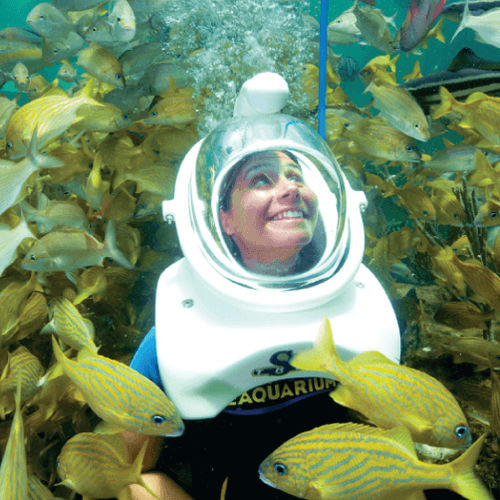
What things can I do after diving?
There are many things you can do after diving. Here we list some:
- Open or read your emails
- Clean your scuba gear and hang it up properly
- Finish reading your book on diving course
- Anything else where you don’t put your health at risk
Summary
The bottom line is this: Due to the dangerous nature of nitrogen saturation from breathing the air mixture inside a scuba diving tank, you want to be sure that you wait for a sufficient amount of time before you expose your body to low pressure such as flying in commercial airlines or climbing a mountain range.
Therefore, if you wish to dive during your vacation, be sure to do so well in advance of your return trip.
And if you come on vacation to Costa Rica, send us a message or call us. We will take you to know Caño Island, one of the best diving destinations in the country.
